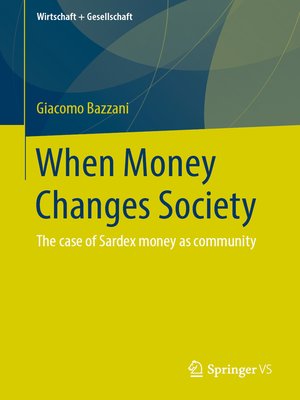When Money Changes Society
ebook ∣ The case of Sardex money as community · Wirtschaft + Gesellschaft
By Giacomo Bazzani

Sign up to save your library
With an OverDrive account, you can save your favorite libraries for at-a-glance information about availability. Find out more about OverDrive accounts.
Find this title in Libby, the library reading app by OverDrive.



Search for a digital library with this title
Title found at these libraries:
| Library Name | Distance |
|---|---|
| Loading... |
Classical sociology considered money as central to the functioning of modern society, relatingit to a progressive expansion of instrumental rationality and the emergence of weaker social ties.Modern money, the universal equivalent described by Simmel, facilitates theexchange of goods and values by providing a single unit of account. This "frees" people and thingsfrom traditional social ties and makes them free to "sell" their work and trade goods on markets thatincreasingly erode national borders. Modern money thus frees the individual from traditional socialties and facilitates the creation of ever larger and more inter-connected markets. Sardex money, onthe other hand, seems to work in the opposite direction: the weak social ties of ordinary economictransactions are replaced by strong ones, characterised by a high level of reciprocity and by an ethical code. Furthermore the movementof goods is restricted to the regional level and much isdone to promote economic exchanges between member companies.







